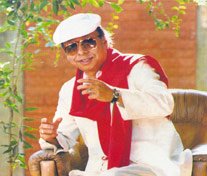


The cherubic face of the man didn't offer much clue about the tremendous talent within. Looks didn't belie a man who could weave magical musical webs; a man who was a complete composer, a hip singer and a versatile instrumentalist. A man named Rahul Dev Burman alias R.D. alias Pancham was all that and more. It's his story.
Born on 27th June 1939 in Calcutta, this prodigious son of the great composer S.D.Burman and a sweet songstress Meera Devi didn't have to look around for musical inspiration. Music literally flowed in his veins. Dada muni Ashok Kumar bestowed upon him the now famous nickname 'Pancham' when he noted how the young toddler would happily babble 'Pa, Pa' at Sachinda's musical sittings! How true that joking prediction would come!
Brought up in a musical household, Pancham soon started imbibing the richness of Indian classical and folk music, at the same time collecting the treasures of Rock, Jazz and Latin music. He learnt sarod from Ali Akbar Khan; tabla from Brijen Biswas and Samta Prasad and Bongo, Conga and Harmonica from God knows whom! Practically he could play every possible instrument.
He began his foray into music by working as an assistant to his father where he caught the eyes of Guru Dutt during the making of 'Pyaasa'. So impressed was Guru Dutt with this 'assistant' who had not even crossed twenty that he offered his next film 'Raaz' to him. Unfortunately the project was shelved and R.D. had to wait for another chance to enter the big league.
Mehmood's 'Chhote nawab' (1961) was Pancham's first musical score. Papa Sachinda made sure that his son got the best by personally requesting Lata to render his son's first song. Mind you this was at a time when Sachinda and Lata were having their personal differences! Lata's sublime ‘Ghar aaja ghir aaye’ was the perfect entry point for Pancham's music.
'Teesri Manzil' (1966) was the real path-breaker for R.D. When Nasir Hussain chose this novice composer for this film overlooking seasoned campaigners like Shankar- Jaikishan and O.P.Nayyar, the film's hero Shammi Kapoor was overtly dismayed. All his reservations vanished in thin air when songs like ‘Aaja aaja main hoon pyar tera’, ‘O haseena zulfon wali’ and ‘O mere sona re’ shook the music-world with their sheer novelty and spirit. These tunes were so novel then that even veteran singers like Asha and Rafi had to dig deep into their vocal resources to live upto them- both of them requiring many rehearsals before the recordings.
This adventurous streak of experimentation gave his music a different dimension and produced something as voluptuous as ‘Piya tu ab to aaja’, as zingy as ‘Dum maaro dum’ and as outrageous as ‘Mehbooba, mehbooba’! Exuberance of soundtracks like 'Carvan', ' Yaadon ki baraat', 'Jawani deewani' and 'Hum kisise kam nahi' firmly established him as the pioneer of fusion music endearing him to the new generations.
Not everyone accepted his success kindly. Many lamented the 'Cheap Westernism' his music represented. To this R.D.'s answer was to deliver classics like ‘Raina beeti jaaye’, ‘Beeti na bitaayi raina’ and ‘Mere naina saawan bhado’. His mature mellow music in 'Amar Prem', 'Kati Patang', 'Aandhi', 'Kinara' and 'Ijaazat' was enough evidence of his versatility as a composer who had a firm grasp on both Indian and Western musical styles.
That he composed music for 331 films in different languages is not as important as his contribution as a trend- setter. The revolutionised, rich, resonant and refreshing rhythm is Pancham's contribution to Indian film music. His rhythms complemented the melody without being overbearing and yet left their impact on the listeners. Don't you still remember the terrific intro- piece for ‘Tere bina jiya jaaye na’?
Listen to the contrasting expressions he achieved through Kishore's vocals in ‘Mere saamne waali khidki mein’ and ‘Kucch to log kahenge’. Look how he managed to get from Lata something as sizzling as ‘Dilbar dil se pyare’ or as sensuous as ‘Baahon mein chale aao’ in defiance of her sedate vocal image. Marvel at the manner in which he presented Asha in classics like ‘Piya baawari’ and ‘Mera kucch saaman’ when all and sundry had summarily dismissed her as just a seductive songstress. All this will tell you the real worth of his musical genius.
For almost a decade before his death on 4th January 1994, Pancham was languishing on the sidelines watching his ordinary peers hogging the limelight. Those who had sadistically watched his fall from grace, now suddenly started heaping praises on him after his sudden demise. Overnight he was iconised as a modern visionary composer. What life couldn't achieve for him, death did! A glory too late but better late than never!!